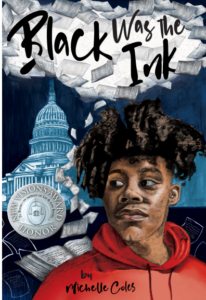This is part of WTOP’s continuing coverage of people making a difference from our community authored by Stephanie Gaines-Bryant. Read more of that coverage.

If you could walk in your ancestor’s shoes, what would you discover? That’s what historical fiction writer and civil rights attorney Michelle Coles explores in her debut novel “Black Was the Ink.”
It’s the story of a teenager from D.C. who takes a life-changing trip to stay with extended family in Mississippi.
While there, Malcolm discovers the diary of an ancestor and is given the opportunity to walk in his ancestor’s shoes, working alongside the first Black members of Congress in the 1870s.
He learns what they were fighting for during a journey that inspires him to fight for present day rights, according to Coles.
“You can better understand a lot of what is happening today by understanding the past,” Coles said.
Malcolm interacts with reconstruction greats like Mississippi’s Hiram Revels, the first African American to serve in the U.S. Senate and Congressman Robert Smalls, representative from South Carolina.
Malcolm is transported to the U.S. Supreme Court in the 1870s when they are announcing a decision that had huge ramifications for how Black people’s rights were going to be protected and enforced by the U.S. Government.
U.S. v. Cruikshank is not as well known as the Dred Scott case or Plessy v. Fergusson, Coles said, but she would argue that the case is even more consequential because it forced the federal government to have a more hands off position when it came to enforcing federal laws intended to protect the civil rights of African Americans.

Maryland-based Coles said she believes that we are still feeling the effects of that decision today. Coles, who worked for the Department of Justice for 12 years, said her background as a civil rights attorney helped shape how she wrote the book.
“I think my background makes the presentation of this book different than other books you may read on similar topics,” Coles said.
Coles also said she tried to infuse her understanding of the law and its implications, breaking it all down in a way that young people, and people who are not lawyers, can really understand. Her husband, who is also an attorney, helped her by pulling from his experiences working as a longtime aide on Capitol Hill.
She said she wants children to know that they can gain “a sense of agency from the book,” and that history is not preordained — we can create the world we want, “by using our voice, by using our intellect, by telling our stories,” Coles told WTOP.
Coles received her undergraduate degree from the University of Virginia and her law degree from Howard University’s School of Law, where she was valedictorian of the class of 2006.

Planet Word Museum in D.C. is helping Coles tell her story through an animated trailer that brings the book to life. More information is available at MichelleColes.com.
Get breaking news and daily headlines delivered to your email inbox by signing up here.
© 2024 WTOP. All Rights Reserved. This website is not intended for users located within the European Economic Area.







